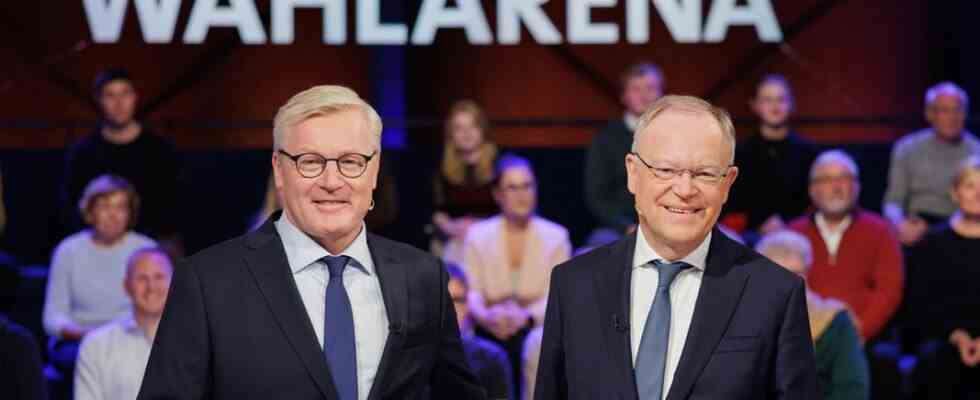Status: 09/28/2022 9:30 p.m
Twelve days before the state elections in Lower Saxony on October 9th, Prime Minister Stephan Weil (SPD) and his deputy Bernd Althusmann (CDU) met in a debate on Tuesday evening on NDR television.
They want to be at the top of the state: Stephan Weil and Bernd Althusmann are applying for the job of Prime Minister of Lower Saxony. A fight that will be decided on October 9th – in the TV duel on Tuesday evening, the two tried to convince the viewers again.
When will the supplementary budget for relief for companies come out?
It was quickly forgotten that Weil and Althusmann had jointly determined the country’s political course over the past five years. Because especially when it comes to energy policy, not only is the mood among people tense, but also among the two top politicians. Before the state elections, it was not possible to get a supplementary budget off the ground that would relieve the burden on companies. Althusmann therefore wants to get the project off the ground immediately after the election, i.e. in November. The incumbent prime minister insists that he would have liked to get the supplementary budget through parliament now – but that failed because of CDU finance minister Reinhold Hilbers. The two frontrunners blame each other. A rare moment in this election period: Because the otherwise level-headed Weil reacts touchedly when Althusmann presents the facts differently.
How to get through the energy crisis?
But it’s not about assigning blame, it’s about finding solutions: How do the two top candidates intend to deal with the energy crisis? Althusmann is campaigning for an energy price cap: “We can’t wait any longer, every day counts.” The CDU man does not omit working on the traffic light coalition in Berlin. Because, on the other hand, proposes an emergency program in the amount of one billion euros. Among other things, he wants to relieve “medium-sized companies that have run into short-term liquidity problems”. The incumbent prime minister is in favor of adjusting electricity prices – the rules need to be changed, people are paying too much.
Clear differences when it comes to nuclear power
In addition to the short-term help, there is also the question of how Lower Saxony wants to position itself in terms of energy technology in the future. It is precisely on this point that the two opponents differ: Althusmann considers the continued operation of the nuclear power plant in Lingen “absolutely necessary”. Otherwise you are heading into a supply bottleneck. The Christian Democrat is convinced that the SPD has completely misjudged the situation. Because, on the other hand, one thing is certain: “We are in a good position in Lower Saxony. Security of supply is our priority, but we don’t need the nuclear power plant for that.” He refers to the federal government’s stress test and points out that Lower Saxony is in any case mainly supplied with gas from Norway and the Netherlands.
Mobility in rural areas: Higher commuter allowance in exchange for discounted local transport
The two also have different priorities when it comes to mobility. Weil wants to use on-call buses to improve the connection to rural areas. He also wants to fight for a discounted local transport ticket – but he makes it clear that more money has to come from the federal government. What is certain for him, however, is that young people should pay significantly less. “The mobility behavior is shaped there,” he is convinced. Althusmann also wants a follow-up ticket to the nine-euro ticket, but is concerned about the financing. In order to relieve the burden on drivers, he says: “We have to start with the commuter allowance.” He advocates 40 cents from the first kilometer.
How can instruction be provided better?
In addition to the turnaround in mobility, the issue of education is particularly important for Lower Saxony. This is generally a matter for the state – and it is extremely difficult. Elementary school teacher Sarah Kollmetz complains that she is working at the breaking point. Lessons are hardly possible in parts, it is more about supervision. Because there is a shortage of teachers. CDU politician Althusmann therefore promises 5,000 additional jobs and school assistants to support them. With a view to the teaching provision, which had reached its low point last year, he says: “I guarantee one hundred percent.” Weil considers such promises to be dubious. Teachers have more work to do. This is also due to the fact that something has changed in the families. “Many families no longer automatically support at home, but expect that to happen at school,” he says. He therefore wants to make the profession more attractive: more educational staff and better pay for primary, secondary and secondary school teachers. A point that the CDU now also wants to go along with.
Immigration as a means to solve the problem of skilled workers?
But not only in the schools there is a lack of skilled workers. The trades in Lower Saxony also suffer from the lack of staff. Weil wants to make dual training more attractive and introduce a “Craft Day” at schools. It also doesn’t work without immigration – he therefore advocates the recognition of qualifications. “We have to make it as easy as possible for people, Germany is not the only country in this situation,” he is convinced. Althusmann also knows that skilled workers “unfortunately cannot be baked”. He is therefore also in favor of qualified immigration. He also relies on retraining. In the field of care, both the CDU and the SPD want to reduce bureaucracy in order to relieve the burden on employees.
After 75 minutes, the duel ends with a look at the stopwatch, which measures the speaking time of the two opponents: Althusmann comes to 22.29 minutes, Weil to 20.56 minutes.
Further information
Further information








